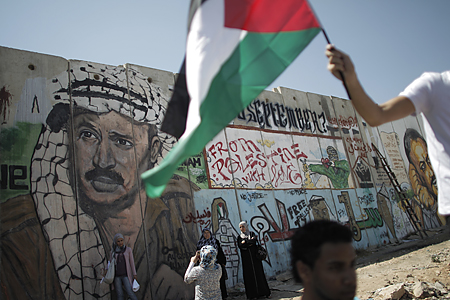
Palestinian women stand in front of a mural portrait of Yasser Arafat during a demonstration at the Qalandia checkpoint in the West Bank, near Ramallah, on September 17, 2011 in support the Palestinian bid for UN membership. (Photo: Marco Longari / AFP / Getty Images)
Behind the bold decision by Palestinian leaders to press for full membership in the United Nations – with its risk of a U.S. veto in the Security Council – is the Palestinians’ calculation of another risk: All the Obama administration stands to lose by conspicuously denying the aspirations of a moderate, democratic national liberation movement in a Middle East newly obsessed with dignity and already slipping from American influence.
“I don’t think they will dare to make things look that bad after these Arab revolutions,” says Nabil Abu Rudeineh, a senior advisor to Palestinian Authority President Mahmoud Abbas. Speaking with TIME before boarding the flight to the New York, Abu Rudeineh on Saturday describes a Palestinian delegation comfortable in its decision to push for full membership, but still willing to at least hear offers. “I’m expecting there will be probable movement through the Americans and Europeans and Quartet during our stay,” he says.
(PHOTOS: Inside West Bank Settlements)
The Palestinians see their position as not only just but also, if not commanding, at least empowering. The mechanics of the world body are problematic indeed – all applications for membership must go through the Security Council, where Obama has pledged to protect Israeli interests. But the statehood effort aims to gather momentum on the winds and tides that are reshaping the region, as well as sympathy for the Palestinian side that has steadily deepened with the length of the Israeli military occupation, which began in 1967 and continues despite two decades of negotiations aimed at ending it.
The last round petered out after only three meetings a year ago, but even so last week a long line of Western diplomats tried to divert Abbas’s path to the UN by making new talks more attractive. Abu Rudeineh reaches into his back pocket and unfolds a thick packet of A-4 paper folded into quarters. “No mention of settlement cessation,” he notes, leafing through the pages. He finds the sheaf from the meeting with former British prime minister Tony Blair, who now heads the so-called Quartet of powers, namely Washington, Moscow, the EU and the UN.
“All that they are offering is ‘attributes of a state,”’ he says. “When you ask what that means, he says the Americans and the Israelis are worried about the ICC.” The ICC is the International Criminal Court at the Hague, where as a state Palestine could lay charges against Israel for building more than 120 settlements on occupied territory.
(READ: Nuts-and-Bolts Questions about Palestinian Statehood)
“This is a pretext, by the way,” Abu Rudeineh adds. “The ICC is not relevant. What’s relevant is we have an Israeli government that’s not ready for peace, that’s not ready for negotiations.” He recalls, in the meeting he attended with American envoys Dennis Ross and David Hale, President Abbas saying: “I just want two things: 67 borders with agreed swaps, and a settlement freeze and I will go immediately to the negotiating table.”
That Israeli prime minister Benjamin Netanyahu enforced a freeze for most of 2010 does not count, Abu Rudeineh says, because it did not include East Jerusalem. Nor was the Palestinian leadership impressed by Netanyahu’s promise — in response to Abbas’ televised announcement Friday that he was proceeding to the Security Council — that if it abandons “futile and unilateral measures at the UN, it will find Israel to be a genuine partner for direct peace negotiations.”
Still, the overture at least had the tenor of diplomacy, a measured game the Palestinians have been playing more adroitly of late. In Ramallah, officials have taken particular pains to blunt accusations that their effort is even intended against Israel. In his Friday speech, Abbas emphasized that the effort was in no way aimed at denying Israel’s right to exit, but only at Israeli policy. At a briefing with reporters a day earlier, his foreign minister was even more politic, recoiling almost physically when asked if the Palestinians would turn to efforts to boycott or sanction Israel. “No one talks about that, and if you expect me to even repeat those words, I won’t,” said Riyad al-Maliki.
Meanwhile, in Jerusalem, Israeli foreign minister Avigdor Lieberman warned of “harsh and grave consequences” if the Palestinian effort continued. His deputy, Danny Ayalon, issued a statement urging that Israel simply annex parts of West Bank if Abbas proceeded. Ayalon is the same diplomat who last year invited Turkey’s ambassador to his office, guided him to a conspicuously lower seat, then pointed out the humiliation aloud to news crews summoned to record the scene.
Indeed it’s been a tough run for Israeli diplomacy of late. In the space of one week this month, Turkey ejected Israel’s ambassador to Ankara and the Israeli ambassador to Egypt fled Cairo after a mob breached the embassy. Israeli diplomats in Amman then convoyed out of Jordan on word of a planned protest outside their facility, which turned out to on the small side.
“They should look at the changes in the Middle East,” Abu Rudeineh says of Israel. “They lost Turkey. They are losing Egypt. If they lose the Palestinian Authority what kind of political understanding are they operating on? Iraq has become an Iranian territory. They are putting themselves in a real dilemma, a real crisis.”

